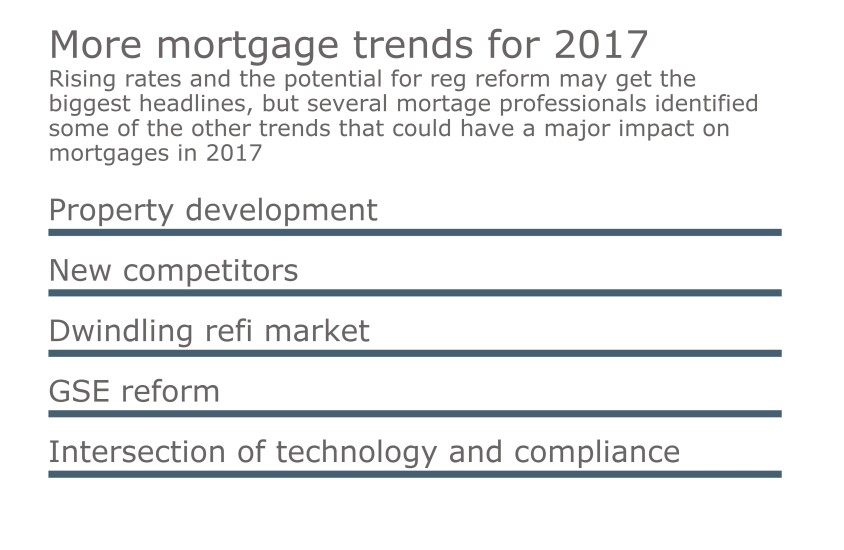
More than just reg reform and rising rates

Development vs. nature in the Pacific Northwest
“There seems to be two camps: Those who embrace ongoing development and expansion, and those who would prefer to keep Oregon and the Pacific Northwest as pristine as possible,” Jennings assessed. “At the moment, there does not appear to be any middle ground. However, this unresolved issue has not deterred people from migrating here. In the meantime, housing inventories continue to remain low, thus driving prices higher.”

GSE reform, bye-bye big banks, hello fintech companies
“One, we need to keep our eye on GSE reform with the new administration. It seems something might happen, and credit unions need to be watching closely because we need a level playing field,” he said. “If the mortgage resale market becomes dominated by the big banks, that will impact our ability to make mortgages.”
Mislansky’s second point: Mortgage lending competitors for CUs are changing from the five big banks to mortgage brokers and mortgage bankers. “The big banks are getting so much scrutiny, the mortgage game is shifting to non-depository companies,” he assessed.
Third, fintech companies are evolving and changing what they do, which he said has major implications. Quicken, for example, is claiming it has funded $5 billion in mortgages. “What does that mean to credit unions if people are turning more to online or mobile mortgage applications? It is changing how mortgage lending is done with speed and a focus on user experience,” he said.
Fintech companies have comparable Net Promoter Scores to credit unions because they focus on convenience and the user experience similar to the way credit unions do, Mislansky noted. “How does fintech change the way credit unions do mortgage lending? It is a threat, and it is an opportunity to partner with some of these.”

Four issues in the year ahead

Could dwindling refis lead to a scramble for purchase mortgages?
Corn said there has been a traditional model that has worked for years in the mortgage space: Lenders establishing relationships with real estate agents. Under the typical marketing service agreement, a mortgage company bought office space at a real estate office and they did co-branded advertising.
“These MSAs were the way to generate leads,” Corn said. “This worked for a long time, but as time has gone on the agents have become the last person to get the lead. People get their MLS online, or they use Zillow. Mortgage companies and agents now are looking to get leads faster.”
In recent years, several entities have created real estate portals, including USAA’s HomeCircle.com and B of A’s Bank of America Real Estate Center. Quicken created a relationship with a real estate portal called My Perfect Home. Corn said this development is part of a “massive shift” in the paradigm.
“These big financial institutions are building real estate portals, and they are giving the leads to the real estate agents,” he said. “The MSAs are going away for a couple of reasons. First, the agents are getting leads from advertising on Zillow or Realtor.com. The average time from a consumer starting to do research to actually closing a transaction is 450 days. To get leads, everyone is moving to real estate portals to get them when consumers first start searching for homes. Mortgage companies advertise on Zillow as well. Second, the CFPB cracked down on MSAs because the two parties were giving each other referrals in violation of RESPA.”

Regulatory focus on cybersecurity
“In 2017, I expect the Consumer Financial Protection Bureau, as well as state and federal regulators, to pivot away from their tight focus on TRID [TILA/RESPA Integrated Disclosures] and move toward what appears to be an ever-increasing area of concern – cybersecurity.”
Jennings said Advantis Credit Union understands how tech-driven the mortgage industry – and banking in general – has become. “Going forward, Advantis will continue to invest heavily in technology to not only meet regulatory compliance mandates, but also to provide a superior member service experience through our technology-driven product and service delivery channels.”





